|
|
|
Sort Order |
|
|
|
Items / Page
|
|
|
|
|
|
|
| Srl | Item |
| 1 |
ID:
153442
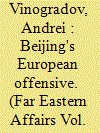

|
|
|
|
|
| Summary/Abstract |
December 11, 2016 marked the 15th anniversary of China becoming a member of the World Trade Organization. According to the Chinese, this date is grounds for automatically granting China the status of a country with a market economy. What has changed in relations between China and the countries of the European Union since that date, and what is behind the European countries' hesitation to grant China this status? How are the results of the referendum in Great Britain influencing relations between China and the European Union? What are the prospects for the European Union and the United States concluding a Transatlantic Partnership trade agreement, and how will China's position in Europe be affected as a result? These questions and others are examined in this work.
|
|
|
|
|
|
|
|
|
|
|
|
|
|
|
|
| 2 |
ID:
103726
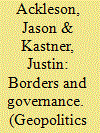

|
|
|
|
|
| Publication |
2011.
|
| Summary/Abstract |
The contemporary dynamics of states, borders, and markets suggest the need for non-traditional methods of regulation and international cooperation in areas such as border inspections and management. The emerging literature on cross-border regions and multi-level governance suggests a framework to understand this development within the general transformation of states under globalisation. To explore these ideas, in this article we focus on the arena of health regulation and the international agricultural and food trade. Multilateral bodies such as the World Trade Organization (WTO), the World Organization for Animal Health (OIE), and the International Plant Protection Convention (IPPC) have endorsed the policy concept of "regionalisation" as a means by which states can preserve trade relations when sanitary (human or animal health) or phytosanitary (plant health) hazards threaten a country's trading status. In this paper, two cases - one historical and one contemporary - illustrate that regionalisation offers a largely functional application of multi-level governance to enhance regulatory and trade capacity. We conclude that governance changes indicated by regionalisation may provide further evidence for the transformation of borders, regions, and states in an era of globalisation.
|
|
|
|
|
|
|
|
|
|
|
|
|
|
|
|
| 3 |
ID:
114562
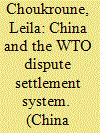

|
|
|
|
|
| Publication |
2012.
|
| Summary/Abstract |
Since its accession to the WTO on 11 December 2001, China has been involved in eight cases as complainant, 23 as respondent, and 89 as a third party. Against all pre-entry predictions, the China-related cases have not overburdened the WTO dispute settlement system, as if all parties were implicitly respecting a latent period before engaging in commercial hostilities. Often portrayed as a "passive rule taker" in the immediate aftermath of its accession, China was not only learning by attentively watching other members' strategies, but also benefiting from the benevolent attitude of its main trading partners, the US and the EU. Moreover, its participation in 89 WTO disputes as third party is not a trivial detail nor is it a sign of passivity, but rather one of cautious preparation that corresponded to the time needed to properly apprehend its new legal tools and all rights thereunder.
While there are many ways of approaching such an already vast body of decisions and related legal and economic literature, this article tries to reflect the uniqueness of the Chinese trade regime and the impact of such a peculiar mix between economic libreralisation and maintenance of the state on other WTO Members in addressing the following questions: the transitional product-specific safeguard measures adopted in reaction to a market disruption caused by Chinese imports, the antidumping and countervailing duties issue, and the restrictions on exportations or importations imposed by China for economic, but also societal and political reasons.
|
|
|
|
|
|
|
|
|
|
|
|
|
|
|
|
| 4 |
ID:
114563
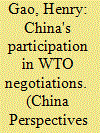

|
|
|
| 5 |
ID:
114557
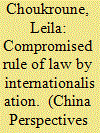

|
|
|
|
|
| Publication |
2012.
|
| Summary/Abstract |
Upon accession to the WTO, China committed to a series of specific obligations often referred to as "WTO+," aimed at the progressive transformation of the Chinese legal landscape. While one cannot ignore a number of very significant achievements as well as a true political responsiveness to other WTO members' concerns, China has not been willing to grasp the WTO opportunity for domestic legal reforms as much as observers, and some Chinese leaders, had hoped for. This incomplete normative revolution now creates tensions between WTO members, as evidenced by an increasing number of disputes shedding a direct light on the lack of transparency in the Chinese legal system. Ten years later, this piece reflects upon predictions about Chinese "rule of law by internationalisation," while putting China's legal reform into a broader political perspective.
|
|
|
|
|
|
|
|
|
|
|
|
|
|
|
|
| 6 |
ID:
114561
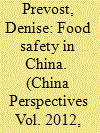

|
|
|
|
|
| Publication |
2012.
|
| Summary/Abstract |
The interaction between trade and health objectives has assumed critical importance for China since its accession to the World Trade Organization (WTO). The wish to improve its access to foreign markets has had a visible impact on China's food safety policy, providing significant impetus for far-reaching reforms. The WTO Agreement on Sanitary and Phytosanitary Measures (SPS Agreement), to which China is now bound as a WTO Member, sets out a "best practices" regulatory model with which national food safety regulation must comply. The disciplines it entails on regulatory autonomy in the area of food safety may present considerable challenges for China but have the potential to promote rationality in such regulation and to prevent food safety regulations that are based on unfounded fears or are a response to protectionist pressures from the domestic food industry. Faced with the possibility of challenges by other WTO Members to its food safety measures on the grounds of non-compliance with WTO rules, China has a strong incentive to improve conformity with this regulatory model, bringing benefits not only to exporters but most importantly to its citizens.
|
|
|
|
|
|
|
|
|
|
|
|
|
|
|
|
| 7 |
ID:
187645
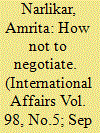

|
|
|
|
|
| Summary/Abstract |
Trade multilateralism would not have featured as a case of ‘abject failure’ had this special issue been planned in 2001. But since then, the World Trade Organization (WTO) has unfortunately become an almost perfect example of how not to negotiate, even when one takes into account the limited successes of the 12th ministerial conference in June 2022. This article proceeds in four steps. The first section outlines the multiple levels of malfunction and breakdown in the organization. The second part argues that a variety of negotiation failures are responsible for the dire straits in which the WTO finds itself today. I identify three broad categories of bargaining failures in this member-driven organization: negotiation mishaps that have led to the Doha deadlocks; negotiation muddles that members have got themselves into while updating the institutional practices of the WTO; and failures on the part of the membership to find negotiated solutions to new systemic challenges. The third section reflects on the interaction of my own research with the world of policy. The fourth and concluding section presents the main ‘Dos’ and ‘Don'ts’ that follow from the analysis, and offers some further policy recommendations.
|
|
|
|
|
|
|
|
|
|
|
|
|
|
|
|
| 8 |
ID:
113957
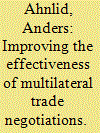

|
|
|
|
|
| Publication |
2012.
|
| Summary/Abstract |
The informal WTO ministerial meeting in July 2008 brought the long stalled Doha Round to the verge of a breakthrough. The reason for its final failure was substantive and not related to the negotiating procedures, which previously had contributed to meager results and failures in the round. The meeting was conducted using procedures that ensured a considerable amount of trustworthiness, transparency and legitimacy, which in turn contributed to effectiveness in the process. Thus, the meeting solved many, albeit not all, outstanding issues on the path towards agreement on so-called modalities for agriculture and industrial products, which in turn would have been necessary for a final successful conclusion of the Round. The 2008 July negotiations demonstrated that complex large-scale multilateral negotiations can be handled procedurally in an acceptable and successful way. The article advances a neglected interpretation of the July meeting, and provides lessons for both future WTO negotiations and multilateral negotiations in other policy areas.
|
|
|
|
|
|
|
|
|
|
|
|
|
|
|
|
| 9 |
ID:
113954
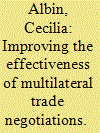

|
|
|
|
|
| Publication |
2012.
|
| Summary/Abstract |
This special issue of International Negotiation explores from different perspectives how multilateral trade negotiations, primarily within the World Trade Organization (WTO), can become more effective. The challenges associated with this task have grown, as the parties and issues involved in such talks have increased in number and diversity. The specific topics addressed include the role of non-governmental organizations (NGOs) and domestic-level factors, agenda management, legitimacy and procedural issues, turning points, the challenge posed by the pursuit of bilateral and regional alternatives, and the question of gains to be had from multilateralism. The conclusions drawn from these studies are wide-ranging and relevant for multilateral negotiations generally. They highlight, among other matters, the significance of decision-making procedures used in the negotiation process.
|
|
|
|
|
|
|
|
|
|
|
|
|
|
|
|
| 10 |
ID:
134817
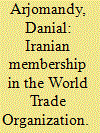

|
|
|
|
|
| Summary/Abstract |
Iran is the largest economy that is not currently included in the World Trade Organization (WTO). This paper addresses why Iran has not yet joined the WTO and whether it is ready to join. Iran's interaction with the General Agreement on Tariffs and Trade (GATT) in 1948 marks the beginning of the relationship between Iran and the WTO. To determine why Iran has not yet entered the WTO, the role and penetration of powerful members of the WTO and Iran's economic position are examined. To determine whether Iran is ready to join the WTO, literature is reviewed concerning the effects of joining for the five most-affected major industries in Iran. The major disadvantages of joining the WTO are described as short-term effects, and the advantages of joining are described as long-term goals. Currently, no clear scheme has been offered to handle the negative effects on the Iranian economy. As the major player, the Iranian government could achieve the long-term goals with a realistic and well-planned strategy or miss the mark through its inattention to the critical economic effects.
|
|
|
|
|
|
|
|
|
|
|
|
|
|
|
|
| 11 |
ID:
156327
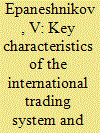

|
|
|
|
|
| Summary/Abstract |
OVER THE PAST FEW YEARS, a fairly stable growth trend in trade between Russia and the European Union has come to an end. Since 2013, the volume of trade between Russia and the EU has undergone an unprecedented decline, although there has been some growth in 2017. For several reasons, the EU has not been very concerned about this decrease.
|
|
|
|
|
|
|
|
|
|
|
|
|
|
|
|
| 12 |
ID:
114560
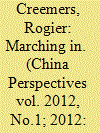

|
|
|
|
|
| Publication |
2012.
|
| Summary/Abstract |
This essay analyses the official and media response to the WTO cases related to cultural products, which China lost. It aims to contextualize both the official discourse and the press discourse in terms of domestic politics and China's trade priorities. It concludes that in the official discourse, China and the US are working at cross purposes, as they have fundamentally divergent concepts of trade in cultural products. The newspaper discourse is more moderate and emphasises developmental and commercial issues, but is also subject to the priorities of Chinese politics.
|
|
|
|
|
|
|
|
|
|
|
|
|
|
|
|
| 13 |
ID:
120880


|
|
|
|
|
| Publication |
2013.
|
| Summary/Abstract |
Recent research has shown that the General Agreement on Tariffs and Trade (GATT)/World Trade Organization (WTO), contrary to common perceptions, does not increase trade. We argue that the effect of the GATT/WTO on dyadic trade flows is conditioned by the strength of market-protecting institutions (MPIs), which are the fundamental determinant of transaction costs. Dyads with weak MPIs do not see an increase in trade from GATT/WTO membership while dyads that have strong MPIs do see an increase in trade from GATT/WTO membership. In the former case, the benefits of GATT/WTO membership are outweighed by the high risk of doing business under weak market protection, but when property rights are well protected, GATT/WTO membership contributes positively to international trade. Empirical analysis of bilateral trade flows from 1948 to 1999 supports this hypothesis.
|
|
|
|
|
|
|
|
|
|
|
|
|
|
|
|
| 14 |
ID:
114559
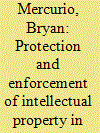

|
|
|
|
|
| Publication |
2012.
|
| Summary/Abstract |
China is without a doubt the world's leading infringer of intellectual property rights (IPRs). China's factories produce counterfeit and pirated products for local and foreign consumption while China's domestic industry infringes patent rights with relative impunity - this despite nearly 30 years of improving laws for the protection and enforcement of IPRs as well as accession to the World Trade Organization in 2001. This brief article seeks to understand the reasons behind China's apparent failure to adequately enforce its IPRs. Finding local protectionism a major impediment to enforcement efforts, the article further analyses whether the central government has the power to enforce IPRs or whether it is powerless to confront and challenge local interests.
|
|
|
|
|
|
|
|
|
|
|
|
|
|
|
|
| 15 |
ID:
158922


|
|
|
|
|
| Summary/Abstract |
India is frequently cast as a troublemaker and blamed for the breakdown of the Doha Round. This article provides a critical re-reading of India’s trade policy and its position in multilateral trade negotiations. It challenges the widespread characterisation of India as a recalcitrant spoiler, intent on derailing trade liberalisation at the WTO. It shows that with the emergence of its highly-competitive, export-oriented services sector, India became one of the leading advocates of global services trade liberalisation in the Doha Round. Yet, not unlike the traditional powers, India’s offensive trade interests are also combined with significant defensive concerns in agriculture.
|
|
|
|
|
|
|
|
|
|
|
|
|
|
|
|
| 16 |
ID:
085558
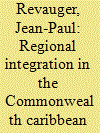

|
|
|
| 17 |
ID:
113956


|
|
|
|
|
| Publication |
2012.
|
| Summary/Abstract |
How does the agenda management process influence the effectiveness of multilateral trade talks in the World Trade Organization (WTO)? How can the all-important agenda be shaped so as to enhance the prospects of an agreement being reached? How the agenda is managed directly affects the negotiation process which follows and the eventual outcome. Yet researchers have paid little attention to the particular dynamics and challenges of agenda management in large-scale multilateral negotiations, and actual practice points to several weaknesses. This article proposes that the complexity of the agenda in multilateral talks needs to be managed and reduced in procedurally just ways if a successful outcome (agreement) is to result. It develops an analytical framework of agenda management in multilateral negotiations and conducts a structured focused comparison to explain the differences in outcomes of two rounds of WTO negotiations: the failure of the 2003 Cancún Ministerial Conference and the success of the 2004 Geneva negotiations in reaching an agreement. The findings support the proposition that a successful outcome depends in part on reducing agenda complexity and that this needs to be achieved in procedurally acceptable (if not just) ways.
|
|
|
|
|
|
|
|
|
|
|
|
|
|
|
|
| 18 |
ID:
172306
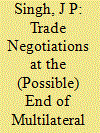

|
|
|
|
|
| Summary/Abstract |
Multilateral negotiations are often facilitated through international organizations, but are not coterminous with them. This essay advances a few ‘mid-level’ propositions with respect to the negotiation structure that provides an overall context and the negotiation process where tactics guide the exchange of concessions. In terms of negotiation structure, a stable institutional structure is giving rise to a transitional one resulting in system spoilers in international negotiations leading to deadlocks and no-agreements. The bargaining phases are marked with games of chicken and grand-standing making it hard to effectively practice common negotiation tactics such as coalition-building, trade-offs and linkages. The article provides examples from the Uruguay Round and the breakdown of the Doha Round of trade negotiations through the World Trade Organization. The essay’s propositions address the breakdown of existing multilateralism through international organizations, but also document the continuation of underlying multilateral principles.
|
|
|
|
|
|
|
|
|
|
|
|
|
|
|
|
| 19 |
ID:
114558
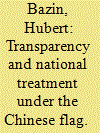

|
|
|
|
|
| Publication |
2012.
|
| Summary/Abstract |
Since 2001, China has, overall, respected the commitments it made when it joined the WTO. However, no "WTO spirit" has been observed that might have led it to go beyond the letter of these commitments, and very many non-tariff barriers are still in place. In view of the modernisation of its legal framework, is there room for improvements that would enable foreign companies to find their place more easily in a rapidly expanding market, or do structural obstacles stand in the way of the developments hoped for by its main partners?
|
|
|
|
|
|
|
|
|
|
|
|
|
|
|
|
| 20 |
ID:
126272
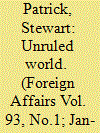

|
|
|
|
|
| Publication |
2014.
|
| Summary/Abstract |
While campaigning for president in 2008, Barack Obama pledged to renovate the dilapidated multilateral edifice the United States had erected after World War II. He lionized the generation of Franklin Roosevelt, Harry Truman, and George Marshall for creating the United Nations, the Bretton Woods institutions, and NATO. Their genius, he said, was to recognize that "instead of constraining our power, these institutions magnified it." But the aging pillars of the postwar order were creaking and crumbling, Obama suggested, and so "to keep pace with the fast-moving threats we face," the world needed a new era of global institution building.
|
|
|
|
|
|
|
|
|
|
|
|
|
|
|
|
|
|
|
|
|